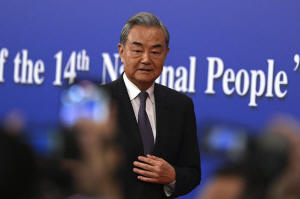China's foreign minister blasts the US over tariffs at his annual
meeting with journalists
[March 07, 2025] By
CHRISTOPHER BODEEN
TAIPEI, Taiwan (AP) — Along with fulminating against the United States,
China’s Foreign Minister Wang Yi reasserted China’s South China Sea
claims, blasted Japan for its past aggression and covered a wide range
of other issues during his annual meeting with the press. Here are some
of the key topics covered during his Friday press conference.
Wang says South China Sea tensions are a ‘shadow play’ driven by US
China has clashed frequently with the Philippines over ownership of and
access to islands in the South China Sea, whose rich fishing grounds
China claims virtually in its entirety. However, Wang was quick to place
blame elsewhere, saying Manila was being manipulated by forces “outside
the region,” its standard term for the U.S.
Wang called the entire conflict a “shadow play,” saying an unidentified
regional official had used the term at a recent meeting, and said each
incident was a “line of script” disseminated by the foreign media with
the goal of “smearing China.”
“China will continue to safeguard its territorial sovereignty and
maritime rights and interests in accordance with the law. When managing
Second Thomas Shoal and Scarborough Shoal, we will also reflect our
humanitarian spirit according to actual needs. But I want to make it
clear here that infringement and provocation will inevitably bear its
own fruit, and those who are willing to be chess pieces will eventually
be discarded.”

Scam centers in Myanmar that prey on Chinese citizens
Wang also said that Chinese cooperation with its neighbors had
eliminated many of the compounds where Chinese nationals, many of them
coerced or lured by false promises of legitimate jobs, are forced to
contact people in China in a bid to extract money from them through
false claims of debts owed or other illegal means.
“All the cyber fraud parks in northern Myanmar near the border have been
cleared. China, Thailand, Myanmar and Laos are working together to crack
down on cyber fraud in the Thai-Myanmar border area. Our mission is to
cut off the evil hands reaching out to the people and eradicate the
cancer of online cyber fraud,” Wang said.
Such operations, usually linked to organized crime, are notoriously
quick to resume operations elsewhere. China has been battling the issue
for years as the gangs grown increasingly sophisticated in their access
to victims' private information. Hundreds of citizens from other
countries have also been caught up in such fraudulent schemes targeting
victims as far away as the United States.
China warns against Japanese support for Taiwan
Wang referred to the upcoming 80th anniversary of the end of World War
II, saying “there are still some people in Japan who have not reflected
on their mistakes.” China's education and propaganda systems keep alive
memories of Japan's brutal invasion and occupation of much of China
before and during the war and anti-Japanese consumer boycotts and other
protests pop-up over perceived slights.
[to top of second column] |

Chinese Foreign Minister Wang Yi leaves a press conference on the
sideline of the National People's Congress in Beijing, Friday, March
7, 2025. (AP Photo/Ng Han Guan)
 Wang also linked the issue to
Taiwan, the self-governing island democracy that was a Japanese
colony until the end of the war and which maintains close ties to
Japan to this day. China claims the island as its own territory and
has threatened to take control by force if necessary. Wang said “it
is better to remember that if Taiwan causes trouble, it is to cause
trouble for Japan.”
China also claims uninhabited islands in the East
China Sea that are controlled by Japan, and regularly sends ships
and planes into areas surrounding them, much as it does with Taiwan.
That prompts Japan to scramble jets to defend what it says are
islands legitimately absorbed before World War II because no other
nation had a legal claim to them. That too has proved a source of
tension in the region and a space where China can challenge the
authority of the U.S. and its allies.
China blasts US turn toward Asia-Pacific
Wand touted China as “the center of stability in Asia, an engine of
economic development and a support for regional security,” while
blasting the U.S. for basing intermediate-range missiles around
China and having “done nothing but stir up trouble and create
divisions.” China advocates “open regionalism and share Asia’s
development opportunities on the basis of mutual respect, mutual
benefit and win-win results.”
Wang said “if every country stresses my country first and is
obsessed with a position of strength, the law of the jungle would
reign (across) the world again.” While China has been the subject of
suspicion and concern from the Indian Ocean to northern Japan, the
South Pacific has lately emerged as a major area of competition
between China on one side and the U.S., Australia and New Zealand on
the other.
China’s secret security agreements and promises of infrastructure
have prompted the three to tighten relations in recognition of the
islands’ strategic geographic location after years of what some have
described as neglect. However, a U.S. cutoff in aid, along with
generous Chinese incentives, could further push them into Beijing’s
arms. Three of these — Tuvalu, Palau and the Marshall Islands are
also among Taiwan’s handful of formal diplomatic allies.
All contents © copyright 2025 Associated Press. All rights reserved
 |